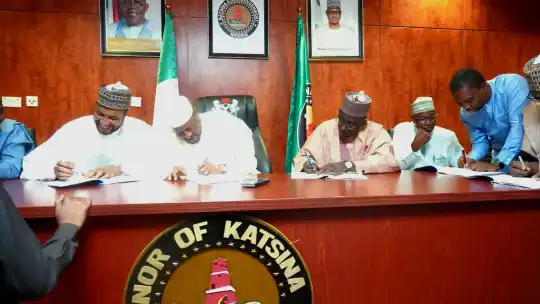The National Agricultural Development Fund (NADF) has taken a major step toward boosting year-round farming in Nigeria by launching a pilot demonstration farm in Katsina State. On Wednesday, NADF signed a Memorandum of Understanding (MoU) with several key partners to establish a 50-hectare all-season farm at the Sabke Dam, located in the state’s arid zone.
This historic agreement, which was sealed during a formal event in Katsina, marks a bold move toward transforming dormant water infrastructure into productive agricultural land. It is expected to drive innovation, support sustainable food production, and open up investment opportunities in agribusiness, irrigation farming, and agricultural technology.
The signing ceremony was attended by Katsina State Governor Dr. Dikko Radda, lawmakers, representatives from the Sokoto-Rima River Basin Development Authority (SRRBDA), and private sector stakeholders including OCP Africa and The Infrastructure Bank.
The MoU clearly outlines the roles and responsibilities of all the participating parties—NADF, OCP Africa, the Katsina State Government, and SRRBDA, with each group contributing vital technical, financial, or administrative support to ensure the success of the demonstration farm.
Mohammed Ibrahim, Executive Secretary of NADF, described the launch as the result of months of strategic planning and collaboration aimed at proving the commercial potential of all-season agriculture.
“This initiative is a proof of concept,” said Ibrahim. “It shows how we can utilise our existing dam infrastructure for sustainable, modern farming. This project started with a visit to Katsina. After that, we decided to fund very bankable technical and commercial feasibility studies to explore how this dam could be optimised.”
He further noted that private partners quickly expressed interest, reinforcing the project’s relevance and potential. “While that is ongoing, private partners came to us knocking to say we are also interested in seeing how this place can be optimised. And that is why we are here today,” Ibrahim explained.
The pilot farm will cultivate four key crops: maize, sorghum, cowpea, and soybeans. It will operate as a live demonstration site, covering every stage of the agricultural value chain—from land preparation and seed selection to soil nutrition, harvesting, post-harvest handling, and market access.
“This model farm will showcase everything from proper land preparation through seed genetics, plant nutrition, harvest, post-harvest, and hopefully a go-to market strategy,” Ibrahim said, praising the Katsina State Government for creating an investment-friendly environment.
“We would like to express our heartfelt appreciation, not only for receiving us but for making an investment-ready climate. The Katsina State Government is providing mechanization and extension services for this project,” he added.
OCP Africa, the project’s technical manager, has already completed a full soil mapping of the Sabke Dam irrigable area. Caleb Usoh, General Manager of OCP Africa, highlighted the importance of customised soil treatment.
“OCP has done a complete soil mapping and will now utilise that to showcase how blends should be put where they are in tandem with soil and crop type,” Ibrahim said. Usoh also noted that the farm will serve as a hub for capacity building, especially for smallholder farmers. “The farm serves as a platform for teaching and for training smallholder farmers on good agronomic practices,” he said.
OCP Africa is expected to supply high-quality fertilizers tailored for both the demonstration farm and any out-grower schemes associated with the project. This strategy aligns with high-CPC agriculture keywords such as “custom fertiliser solutions,” “soil mapping technology,” and “precision agriculture.”
The Infrastructure Bank is contributing as both a financial advisor and co-funder. “The Infrastructure Bank is also funding part of the CPPs and other inputs we are bringing,” Ibrahim noted, underlining the importance of diversified funding in agricultural projects.
Ibrahim expressed optimism about the potential impact of the pilot farm, saying, “When the studies are out, we will not only have a reputable bankable study, but we will have had a model on ground to showcase.”
Governor Radda of Katsina State also expressed his full support, stating that the project aligns with the state’s economic and social development goals.
“When the idea of the project was introduced to me, I quickly jumped into it, given the fact that the chain of benefits it will have on the economy of our state and on the livelihood of our people,” he said.
He also stressed the importance of keeping the project operational all year round. “We want to have activities in that project all year round, so that we keep our people busy, we keep our facilities busy, and we optimize the use of the resources spent to build that very big dam that has been left fallow for a very long time.”
Abubakar Malam, Managing Director of SRRBDA, applauded the collaborative effort. “With the Renewed Hope Agenda, we are proud to donate 50 hectares of land… for the development of this project and for food security in the country,” he said.
Hon. Sada, Chairman of the House Committee on Water Resources, described the moment as historic and pledged the legislature’s support.
“Today marks one of the most happiest moments for me to see that this dam is being utilized,” he said. “If we allow this pilot project to fail, it is our failure.”
As part of its commitment to transparency and effective project delivery, NADF is also deploying a digital monitoring and evaluation (M&E) platform.
This will ensure proper tracking of resources, process monitoring, and data-driven decision-making to support adaptive management. Such digital tools in agriculture not only improve efficiency but also appeal to investors and development agencies focused on agricultural innovation.
In other news, NADF has warned against fake AgGrow programme.

